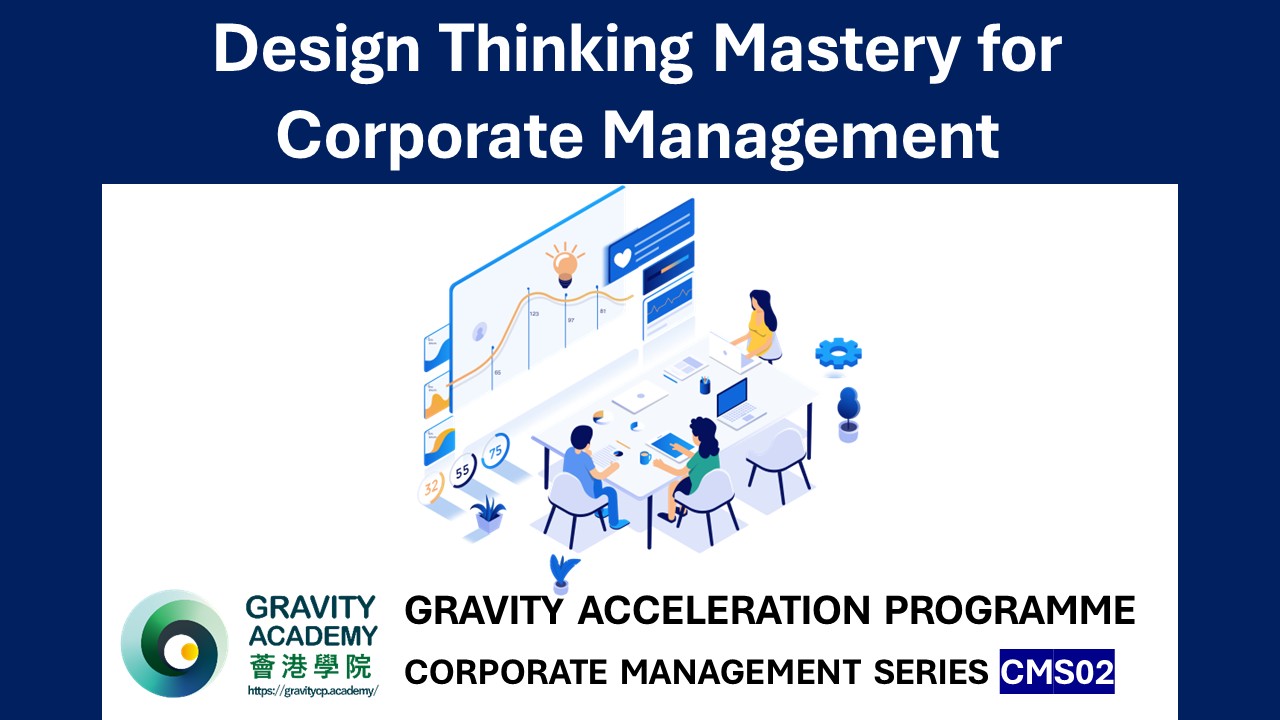CMS02: Design Thinking Mastery for Corporate Management

About Course
1.1. Introduction:
- Skill: Mastery of Design Thinking for effective management and innovation.
- Led by: Ir Prof Alan Lam at Gravity Academy.
- Aim: Equip senior managers with design thinking skills to foster creative problem-solving and enhance corporate strategy.
1.2. Course Outline:
- Introduction to Design Thinking
- Empathy in Design Thinking
- Defining Problems Clearly
- Ideation Techniques and Tools
- Prototyping Best Practices
- Testing and Iterative Improvement
- Integrating Design Thinking in Corporate Strategy
- Design Thinking for Product Development
- User-Centered Design Principles
- Managing Innovation Teams
- Measuring Design Thinking Outcomes
- Real-World Applications and Case Studies
1.3. Course Overview:
This course aims to provide senior management with the comprehensive knowledge and skills necessary to implement Design Thinking within their organizations effectively. Through a combination of theoretical lectures, practical workshops, and real-world case studies, participants will learn how to utilize Design Thinking to solve complex business problems, innovate, and drive strategic initiatives.
1.4. The Curriculum:
- Introduction to Design Thinking:
- Understanding the concept and importance of Design Thinking in today’s business environment.
- Historical context and evolution of Design Thinking principles.
- Empathy in Design Thinking:
- Techniques for developing a deep understanding of customer needs and experiences.
- Methods to cultivate empathy within a corporate setting.
- Defining Problems Clearly:
- Techniques for framing and defining business problems accurately.
- The importance of problem definition in the innovation process.
- Ideation Techniques and Tools:
- Brainstorming methods and tools to generate a multitude of ideas.
- Structured ideation sessions and creativity enhancement techniques.
- Prototyping Best Practices:
- Steps to develop prototypes quickly and effectively.
- Importance of rapid prototyping in validating ideas.
- Testing and Iterative Improvement:
- Methods for testing prototypes and gathering feedback.
- Continuous improvement through iteration based on user feedback.
- Integrating Design Thinking in Corporate Strategy:
- Aligning Design Thinking with corporate goals and initiatives.
- Roadmaps for embedding Design Thinking into corporate culture.
- Design Thinking for Product Development:
- Applying Design Thinking to streamline product development processes.
- Enhancing product innovation and user satisfaction.
- User-Centered Design Principles:
- Principles and practices of User-Centered Design (UCD).
- Ensuring solutions address real user needs and experiences.
- Managing Innovation Teams:
- Strategies for building and managing diverse innovation teams.
- Fostering collaboration and creativity within teams.
- Measuring Design Thinking Outcomes:
- Metrics and KPIs to evaluate the impact of Design Thinking initiatives.
- Tools for measuring success and demonstrating value.
- Real-World Applications and Case Studies:
- Analysis of successful Design Thinking implementations in various industries.
- Learning from real-world examples and best practices.
1.5. The Instructor:
Ir Prof Alan Lam: A seasoned expert in corporate management and innovation, Prof Lam brings a wealth of practical experience and theoretical knowledge to the course. His leadership and teaching blend real-world insights with academic rigor, ensuring that participants gain applicable skills and understanding.
1.6. Why Choose This Course:
- Expert guidance by Prof Alan Lam.
- Comprehensive and actionable content tailored for senior management.
- Engaging and interactive learning formats, including workshops and case studies.
- Access to a robust network of peers and industry leaders.
1.7. What Will You Obtain:
- Mastery of Design Thinking principles and their application in business contexts.
- Enhanced creative problem-solving skills. – Ability to foster a customer-centric approach within your organization.
- Knowledge on how to lead and manage innovation teams effectively.
- Tools and techniques to integrate Design Thinking into corporate strategy.
- Insight into real-world applications and successful case studies.
1.8. Suitable Candidate:
- Senior management and corporate teams at large organizations.
- Executives responsible for strategic planning and innovation.
- Product development managers and team leaders.
- Professionals looking to enhance their creative problem-solving capabilities and drive innovation within their companies.
Course Content
MS02-Lecture
MS02-Textbook
00:00MS02 – In Class Exercise
Student Ratings & Reviews
